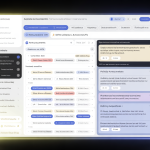
Course Outline: How to Use Data Analytics for Inventory Management, Customer Trend Analysis, and Personalized Marketing
Module 1: Introduction to Data Analytics
-
Overview of Data Analytics
- Definition and importance
- Key concepts and terminology
-
Role of Data Analytics in Retail
- Historical perspective and evolution
- Current trends and future outlook
-
Types of Data in Retail
- Transactional data
- Customer data
- Inventory data
Module 2: Foundations of Inventory Management
-
Introduction to Inventory Management
- Importance of efficient inventory management
- Challenges and common issues
-
Data Analytics in Inventory Management
- Types of data used (sales data, stock levels, lead times)
- Key performance indicators (KPIs)
-
Tools and Technologies
- Inventory management systems
- Software tools (e.g., Excel, specialized inventory software)
Module 3: Analyzing Inventory Data
-
Data Collection and Cleaning
- Methods of data collection
- Data cleaning techniques
-
Descriptive Analytics
- Summarizing current inventory status
- Identifying patterns and trends
-
Predictive Analytics
- Forecasting demand
- Inventory optimization models
-
Prescriptive Analytics
- Reordering strategies
- Minimizing stockouts and overstock
Module 4: Customer Trend Analysis
-
Understanding Customer Data
- Types of customer data (behavioral, transactional, demographic)
- Importance of customer segmentation
-
Analyzing Customer Trends
- Identifying patterns in customer behavior
- Seasonal trends and their impact
-
Tools for Customer Trend Analysis
- Customer relationship management (CRM) systems
- Analytical tools (e.g., Google Analytics, BI tools)
Module 5: Personalized Marketing
-
Introduction to Personalized Marketing
- Definition and importance
- Benefits and challenges
-
Data-Driven Marketing Strategies
- Segmentation and targeting
- Creating customer personas
-
Using Data for Personalization
- Analyzing customer preferences and behaviors
- Personalized email marketing
- Dynamic website content
-
Tools and Technologies for Personalized Marketing
- Marketing automation platforms
- Personalization engines
Module 6: Integration of Data Analytics in Retail Operations
-
Combining Inventory Management and Customer Insights
- Aligning inventory levels with customer demand
- Seasonal and promotional planning
-
Case Studies and Real-World Examples
- Success stories of data-driven inventory management
- Personalized marketing campaigns that worked
Module 7: Practical Applications and Hands-On Training
-
Hands-On Projects
- Analyzing sample data sets
- Creating inventory forecasts
- Developing personalized marketing strategies
-
Tools and Software Training
- Step-by-step tutorials on key tools
- Best practices for data management and analysis
Module 8: Ethical Considerations and Best Practices
-
Data Privacy and Security
- Ensuring customer data privacy
- Compliance with regulations (e.g., GDPR, CCPA)
-
Best Practices for Data Analytics
- Maintaining data integrity and accuracy
- Continuous improvement and learning
Module 9: Future Trends and Advancements
-
Emerging Technologies
- AI and machine learning in retail analytics
- IoT and its impact on inventory management
-
Preparing for the Future
- Staying updated with industry trends
- Continuous professional development
Module 10: Course Conclusion and Certification
-
Review and Recap
- Summary of key concepts and skills learned
-
Final Project Presentation
- Presenting projects to peers and instructors
-
Certification
- Course completion certificate
- Opportunities for further learning and specialization
This course outline provides a comprehensive framework for understanding and applying data analytics in inventory management, customer trend analysis, and personalized marketing, ensuring participants gain practical skills and knowledge for real-world applications.



